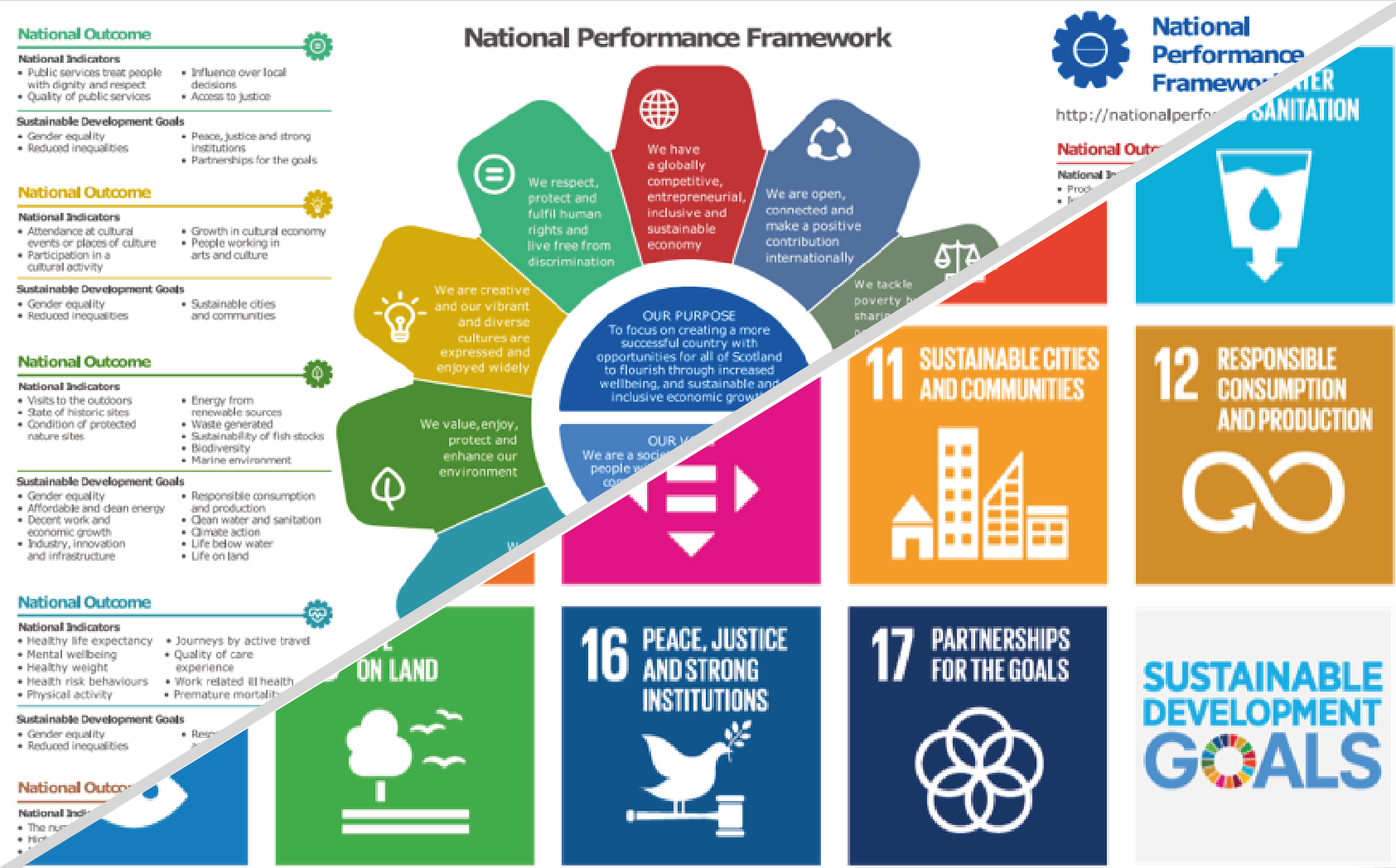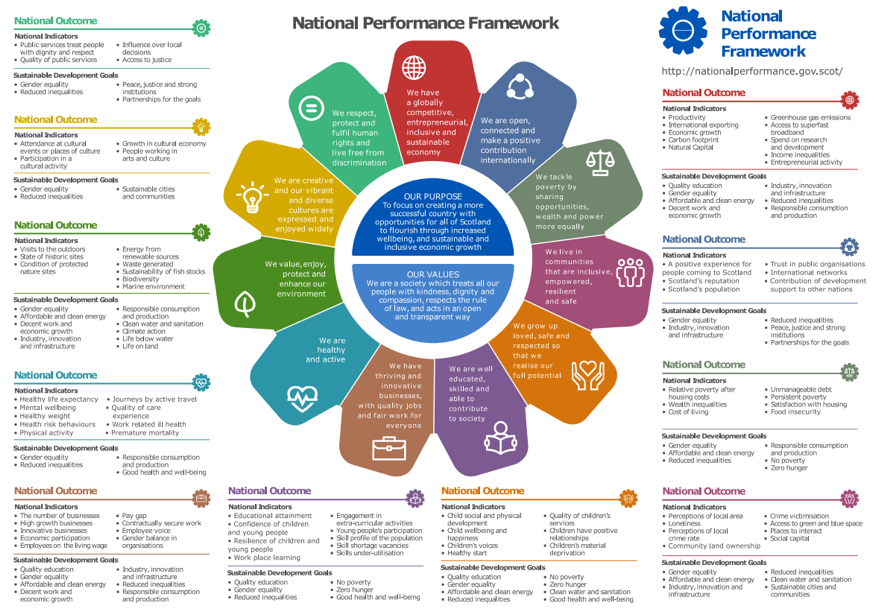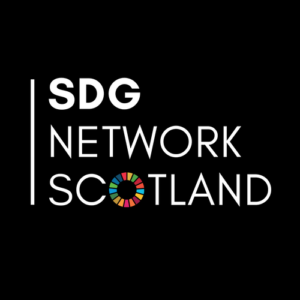Can pretty graphics help create a better world?

You’ve seen and heard of the Sustainable Development Goals (SDGs), and perhaps Scotland’s new National Performance Framework (NPF)… but do you really know what they mean for the University or for you?
We asked guest blogger Paul Bradley to explain how some zeitgeist acronyms and colourful graphics are helping to create a better world.

Paul Bradley
Paul Bradley is Project Coordinator for Open Government and the Sustainable Development Goals (SDGs) at the Scottish Council for Voluntary Organisations (SCVO), the national body representing the interests of charities, voluntary organisations and social enterprises in Scotland.
Problems – especially global problems – are not pleasing on the eye. Yet in order to solve them, everyone must pluck up the courage to look.
We know from experience that the biggest challenges our world faces – poverty, hunger, climate change and much more – will only be addressed if the public, private and third sectors work in partnership. We have to acknowledge a simple truth: neither we nor our governments can secure real change alone.
That’s an almighty challenge when we’re all working towards different outcomes and visions. So how do we make it simpler for this partnership approach to actually work?
Answer: the UN Sustainable Development Goals.

The UN’s Sustainable Development Goals, launched in December 2015
What are the Sustainable Development Goals?
Following the largest public consultation ever undertaken, the SDGs were adopted in 2015 by the UK and the other 192 member states of the United Nations. Nicola Sturgeon confirmed that the Scottish Government would be one of the first anywhere in the world to commit to meeting the SDGs, both at home and overseas.
The SDGs are a set of 17 Goals and 169 targets that call for a number of changes, such as no poverty and zero hunger to good health and tackling climate change, as well as fighting inequality and building sustainable economies and communities.
Importantly, they are a global framework and roadmap towards building a more equal and sustainable future for the world we live in by 2030. Equally importantly, they are visually appealing.
The challenge for all governments is how exactly they will translate the SDGs into action in their national context? The Scottish Government has answered that by incorporating the SDGs into its own National Performance Framework (NPF), fulfilling the First Minister’s commitment to embed the SDGs in all government activity. It too has aesthetics on its side.

Scotland’s National Performance Framework, launched in June 2018
What is Scotland’s National Performance Framework?
The National Performance Framework is important to us all. It sets the Scottish Government’s overarching purpose and the indicators that show how the country is performing against National Outcomes that cover economic, health, social, educational and environmental areas.
The importance of the SDGs being used to frame Scotland’s Performance Framework should not be ignored. The paradigm shift for people and planet that can be realised through the SDGs has supported a greater focus on wellbeing and environmental health in the very tool that is used to measure our society’s progress; this will have a big impact on the future decisions our government takes.
The National Performance Framework, framed by the SDGs, sets the destination for where we want Scotland to be by the end of the next decade. A big question for those in the public, private and third sectors is how will they work together in supporting our government to secure real change?
What contribution can the University of Edinburgh make?
The SDGs give us a platform to think bigger about the contribution we make to society. It is vital that universities and their students are engaging with the big issues of the day that are reflected in the SDGs and Scotland’s new National Performance Framework. I’m pleased to learn that the University of Edinburgh has signed the Sustainable Development Goals Accord and now reports on how it contributes to meeting each of the goals.
This is important not only because of the role of educational institutions in equipping the next generations with the knowledge and skills needed to contribute to sustainable development. It’s just as important that universities consider how they can model their research strategies towards finding solutions to the most pressing challenges our societies face.
Then there’s the need for universities to stay ahead of their competition. In a growing marketplace where future learners will have much more choice, those institutions demonstrating greater corporate responsibility will find it simpler to attract talent both in terms of students and a future workforce. We know that younger generations prefer organisations and brands that make a positive contribution to social and environmental wellbeing, and universities should be pioneering in the examples they set to wider society.
 Our priority must be to translate Scotland’s new National Performance Framework and the SDGs into tangible action, which is why we’ve set up Scotland’s National Platform for the SDGs and Scotland’s SDG Network to share learning a build collaboration across Scotland. But what more can we do?
Our priority must be to translate Scotland’s new National Performance Framework and the SDGs into tangible action, which is why we’ve set up Scotland’s National Platform for the SDGs and Scotland’s SDG Network to share learning a build collaboration across Scotland. But what more can we do?
What might our contribution look like?
Firstly, we can look at what we as individuals and organisations are already doing to contribute to Scotland’s new National Outcomes and the SDGs. How are we capturing and communicating this, our strengths and the positive impact we’re making today?
By using the National Outcomes and SDGs to map our contribution to the big issues of the day, we can uncover and demonstrate our impact across many more areas, which will help to rejuvenate interest and prioritise the political debate and public interest around our areas of work.
Secondly, by looking at how our work aligns with Scotland’s National Outcomes and the SDGs, we might also reveal important areas where we’re less active. This can signal opportunities for further work and support the fostering of new, stronger partnerships and collaboration with other groups and organisation’s we might not have considered working with before.
Finally, there’s embedding an organisation’s commitment and actions on the SDGs into strategic plans and operational elements. The SDGs should become business as usual at the University of Edinburgh, with the institution’s contributions across learning and teaching, research, organisational governance and external leadership fully monitored, evaluated and communicated.
Universities – and educational institutions in general – are crucial to achieving Scotland’s new National Outcomes and the SDGs. As leaders in research, education and innovation, they have the opportunity to inspire so many people. Colourful communications will help… time to get designing.
For more information and to join Scotland’s SDG Network, visit www.globalgoals.scot
Contact Paul at paul.bradley@scvo.org.uk
Find out what the University of Edinburgh is doing to meet the SDGs





Recent comments